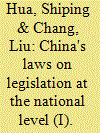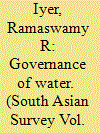|
|
|
Sort Order |
|
|
|
Items / Page
|
|
|
|
|
|
|
| Srl | Item |
| 1 |
ID:
171138


|
|
|
|
|
| Summary/Abstract |
The emergence of Lethal Autonomous Weapon Systems (LAWS) offers a comparatively low adoption-cost strategy to emerging great powers that would allow them to offset the conventional military advantage enjoyed by their rivals, which threatens the established global balance of power. This article critically analyses the role of China and the United States in the development of the “hardware” and “software” components of LAWS, concluding that, while the demonstration point has not yet been reached, the incubation of this emerging revolution in military affairs has already begun to have a geopolitical impact.
|
|
|
|
|
|
|
|
|
|
|
|
|
|
|
|
| 2 |
ID:
109040


|
|
|
|
|
| Publication |
2011.
|
| Summary/Abstract |
In this issue of Chinese Law and Government and the next (September-October, vol. 44, no. 5) we reflect the changes that have taken place in China's legislative system in the past three decades. It is important to publish these two issues at this moment, as the Chinese government announced in 1997 that by the year 2010, China should have formed a comprehensive socialist legal system with Chinese characteristics.1 To be as truthful as possible in sketching this picture we have decided to include original documents, not analytical articles that explain the developments of China's legislative reforms.
|
|
|
|
|
|
|
|
|
|
|
|
|
|
|
|
| 3 |
ID:
099617


|
|
|
|
|
| Publication |
2010.
|
| Summary/Abstract |
The term 'water governance' encompasses a wide range of issues of water policy, management, sharing, rights, conflicts, social justice and equity, conservation, sustainability and so on; and almost all of them involve legal questions. This article provides a broad overview, both explanatory and prescriptive, of some of the legal issues relating to water. These will include the question of ownership of water; the relationship between the state and civil society; the doctrine of public trust; the distinction between the right to water (that is, water as life-support) and water rights (use rights such as for agriculture, industry, etc.); water-related disputes of all kinds (including river water disputes) and the principles, entitlements, relative priorities and institutional arrangements needed for avoiding or resolving them; water markets and the question of privatisation of water; the regulation of water use in the interest of equity, social justice, harmony and sustainability and so on.
|
|
|
|
|
|
|
|
|
|
|
|
|
|
|
|
| 4 |
ID:
161696


|
|
|
|
|
| Summary/Abstract |
This article examines the religious and intellectual dynamics behind the Ottoman military reform movement, known as the New Order, in the late eighteenth and early nineteenth centuries. Conventionally, the New Order has been examined within the framework of the Westernization of Ottoman military and administrative institutions. The Janissary-led popular opposition to the New Order, on the other hand, has been understood as a conservative resistance, fashioned by Muslim anti-Westernization. This article challenges this assumption, based on a binary between Westernization reforms versus Islamic conservatism. It argues that the Janissary-led popular opposition, which was consolidated long before the New Order, developed as a form of resistance by antinomian elements blocking the top-down disciplinary policies of the central state throughout the seventeenth and eighteenth centuries. The New Order programme, which was unleashed in 1792, was also opposed by the Janissary-led coalition, on the basis that it would wipe out vested privileges and traditions. Supporting the New Order, we see a coalition and different intellectual trends, including: (i) the Euro-Ottoman military enlightenment, led by military engineers and scientists, which developed an agenda to reorganize and discipline the social-military order with universal principles of military engineering and (ii) Islamic puritan activism, which developed an agenda to rejuvenate the Muslim order by eliminating invented traditions, and to discipline Muslim souls with the universal principles of revelation and reason. While the Euro-Ottoman military enlightenment participated in military reform movements in Europe, Islamic activism was part of a trans-Islamic Naqshibandi-Mujaddidi network originating in India. We thus witness a discursive alliance between military enlightenment and Muslim activism, both of which had trans-Ottoman connections, against a Janissary-led popular movement, which mobilized resistance to protect local conventions and traditions.
|
|
|
|
|
|
|
|
|
|
|
|
|
|
|
|
| 5 |
ID:
165632


|
|
|
|
|
| Summary/Abstract |
IN THE PAST three or four years, a movement to ban "autonomous combat robots," which in Russia are called "lethal autonomous systems" (in Western literature, LAWS), has been gaining strength in the world but remains almost unnoticed in Russia. Their prohibition is being advocated by the nongovernmental organizations Stop Killer Robots, Article 36, the International Committee for Robot Arms Control; prominent business leaders like Elon Musk and Steve Wozniak; Nobel laureates; scientists and programmers working in the field of artificial intelligence; and even entire corporations. Some believe that fully autonomous weapons will not be able to comply with International Humanitarian Law (IHL) and could create confusion when it comes to identifying individuals responsible for the illegal actions of robots. Others believe that even if "terminators" could one day perform "combat functions" more precisely and judiciously than human fighters, their autonomous use must still be prohibited in the interest of the highest values of human dignity.
|
|
|
|
|
|
|
|
|
|
|
|
|
|
|
|
| 6 |
ID:
092457


|
|
|
|
|
| Publication |
2009.
|
| Summary/Abstract |
The Republic of Uganda is presently engaged, as many other developing countries, in reform of its intellectual property laws. The process raises a number of questions as to whether it addresses priorities besides the legal framework. What has prompted the reforms and what systems of innovation does the country have so as to harness the power of patents in enhancing Uganda's technological capacity? The article also challenges the philosophy and orthodoxy that underpins the basis for patent protection in facilitating the transfer of technology to developing countries and stimulating innovations. In particular, it is argued that patent legislation reform can be meaningful if it is met with marching reforms outside the ambit of the law.
|
|
|
|
|
|
|
|
|
|
|
|
|
|
|
|
|
|
|
|
|